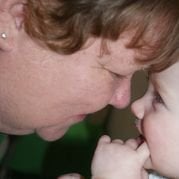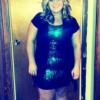Search the Community
Showing results for '"Weight gain"'.
Found 15,901 results
-
Hey You! You are the one who gave me my pretty signature...in case anyone ever wondered. How are you?! I have seen your sister's Before/So-far pics on the Before/After thread and she looks wonderful. Did you ever get any weight gained? Good to see you, girl.
-


I Was In Denial For A Long Time....how About You?
AliveAgain replied to Queen of Crop's topic in POST-Operation Weight Loss Surgery Q&A
I know exactly what you mean. It is like a switch has been flipped in my brain that just had it makes sense very suddenly. I've only been overweight/obese for the last six years (gained 100lbs in a single 12-month period, very rough year). The last 30-40 pounds came on over the subsequent years being frustrated with the initial weight gain. Joints hurt every time I tried to get into a routine again, I could not find sports bras that fit me in my new large size. It depressed me, so my eating habits actually got much worse after gaining that extra weight. Funny, I had to gain weight to eat worse than I did before. Not to mention hitting my 30's and what that does to hormones and metabolism. I wasn't really eating differently than what I ate when I was 28 years old, but I wasn't exercising at all and I was older. It was terribly difficult to see that I needed to adapt. Even the year or so before surgery, I was eating so healthy. Salads, lean meats, no soda, avoid fried foods, etc. -- except I wasn't journaling and even healthy foods in "too large" quantities can be high in calories. I know the healthier eating habits staved off getting any higher than I was (I stayed at 265 for a long time), but I was still working myself like crazy 60+ hours per week and not getting active. I have two very healthy doctors in my family, many friends who are trainers or do triathlons, and yet I just couldn't get it. I had the knowlege of "calories in/calories out" and nutrition, sleeping well, killing soda and avoid refined sugars and carbs. But I wasn't always applying it. The other odd thing is that even though I went from buying 4/6 and XS clothing all the way to buying 22/24 and 1-2/X clothing, I never perceived myself as fat. I always saw the skinny me when I looked down. Then I'd look in a mirror and it felt like I was looking at another person. Or I'd get in an airplane seat and the belt wouldn't fit. Or some innocent kid would ask me if I was having a baby. These little innocuous events seemed weird to me, like I truly thought the airlines were making their belts shorter and taking away legroom. The brain is really funny that way, how it can be your worst enemy. Now that I've had the surgery and dropped nearly 55 pounds, I get it. I totally see what I was missing. Now that I journal and measure my foods, I see how the large portion sizes eating out are not smart. I understand how staying hydrated helps the body shed. And it's amazing how much I want to tell other people now what they're doing wrong. I see it in their eyes when they're ordering in restaurants how they are keeping themselves unhappy. They see surgery as extreme, but I see it as having on of the healthiest relationships with food I've ever had in my life! -
Kickboxing is one of the best things you can do for weight loss, muscle building and strength. I've done it for a long time (before weight gain) and I loved it. I can't wait to get back to it! Sent from my SM-G920T using the BariatricPal App
-


Pre-op diet...... Destroyed!
Theresa Alvarado replied to waitingtoexhale's topic in PRE-Operation Weight Loss Surgery Q&A
Hello there DESTROYED! It;s going to be OK.... take a deep breath, relax.. now try to focus and remember why you started down this path in the fist place. I am in your shoes so I understand. I am pre-op too and haven't even been given a surgery date because they thought I was too depressed to have surgery... I on the other hand didn't think I was as depressed as they said. ANYWAY... back to you. I think what you are experiencing is normal we are such creatures of habit and WE OBVIOUSLY LOVED FOOD! It is hard to think we are going to have to give up stuff we love, but I am trying to tell myself by giving myself this pep talk.... Hey look, you need to do this, you need to get this weight off, It's only food, and the food will be there when I am on my path to my new healthier life, you will be able to eat some of the thing you love, just less of them Lol. I didn't think I could do it either but to tell you a short story, back in 2010, I made up my mind to get the weight loss surgery after I met someone that lost 90 lbs in 3 months (by the bypass) at that time my insurance required 6 months on a diet seeing a Dr. I made it through up to a few weeks of my 6th month and final dr visit before they would approve me. I starting this weight loss adventure thinking well if I have surgery I am going to have to be able to do the 2 wks of liquids so needless to say over this 6 month struggle I rotated every 2 weeks on eating a liquid diet, and then I would eat regular foods but just less. I lost 80 lbs within that 6 months times on my own LOL!!!! BUT here is the bad part of my story... I was so close to surgery, then I was diagnosed with CML (Chronic Myloid Leukemia) and was not allowed to have ANY SURGERIES!!! until I was in remission. The big side effect of the chemo pill I take is (drum roll) rapid weight gain and adema! so I have gained it all back, the first 10 lbs within 3 day of treatment. It is only within the last year and a half that I am able to have surgery, and I restarted my bariatric journey last Nov but the clinic held me back because of depression) and PTL I am in remission and waiting for approval. My point is that I kept trying ... you see nothing is perfect, you are going to reach road blocks, but just keep your car somewhere between the white lines on the road, and moving in the direction of your goals!!! YOU CAN DO THIS! Please don't give up...the pinto Beans will be waiting for you and for me in our new lives. Stay strong -


To Tell ....or not to tell
Chancie replied to attitudefree's topic in PRE-Operation Weight Loss Surgery Q&A
Weight loss AND weight gain is very personal.... But I chose to tell only a select few int he beginning... of course my employer, because I was already out on a LOA- but wanted to explain my decision. I HAD to improve my life to be able to continue to work. I didn't even tell my kids until a few weeks before the surgery so I could get transportation to the hospital!!:blushing: When I did go back to work... I had lost about 25 pounds, and people noticed "something different" I decided to tell whoever asked... there is not "Secret Cure" for losing weight, and I wsn't trying to "fool" anyone... I felt that at least I was in controll of what was said. Alot of people didn't even notice until i lost a signifigant amount! And would ask how I did it... well.. working in retail.. i figured by the time I told ONE person... the whole store would know it! But I have alot of support there.... people I didn't think would support my decision have! The only problem with people knowing that you had weight loss surgery is they all say " don't get tooo thin" That TOO... is a personnal decision. And thats what i tell them. They have only known me as obese... so of course seeing me lose weight is different for them too. Chancie -
Hi... i know this has possibly already been covered... but i suppose this is my story... I had lapband surgery in July 2007.... lost 20 kg... and my band erroded on 12 months resulting in m having it removed in July 2008.... Now 12 months on and having kept my weioght off for 9 months... and now having had a weight gain of 8 kg... approx 16 lb in the last three... it is time for me to rethink my surgical options... I alternate between rebanding or sleeve.... my against banding is that it may erode as quickly again... My against sleeve is that there is metal staples .... I would be interested in others thoughts and stories as to what decisions they made....and would appreciate the help My surgeon is open to doing both surgeries, and he wants me to make the decision to what is best for me.... Heather....
-
I was banded March 2007. I have not only not lost any weight, I've gained 3lbs over the past 10 months. I have been filled to the max. I don't eat much, let's be honest, I can't. I can't even eat the 4 oz portions suggested. Yes, I'm eating the right foods. I work out 3 to 5 days a week at least 1 hour to 2 hours each time. I was considered a low BMI on the lapband scale but still enough of a BMI to get the surgery covered by insurance. I'm frustrated and disappointed. Isn't there anyone out there that has had this happen? What's wrong with me?
-


Lap band revision before big weight gain
Snowgator posted a topic in Revision Weight Loss Surgery Forums (NEW!)
Anyone have vsg after lap band removal? I had my band removed 9 months ago and am slowly gaining. BMI 27. Considering Dr. Pompa in Mexico. Any advice welcome! -
Deb, Well that is one thing I have done. I've gone to the same Doc for the past 15 yrs for everything. He has lots of documentation of weight gain, weight loss, energy levels,joint pain, he knows my weight struggles, which is good he is also very easy to talk to. I don't feel I will have any trouble getting his support. Heidi
-


College bandsters- how long until back in class?
woo pig sooie replied to janesays's topic in LAP-BAND Surgery Forums
i would def. not have the surgery during the semester. i was miserable (and so out of it thanks to the liquid pain meds) for the first week after that i could have never imagined trying to walk the hills on my campus. some people say "it's not that bad," but i will be the first to admit that i am a major whimp. still, at the age of 21, if i am sick i curl up in my mom's lap and make her scratch my back, rub my ears, and do all those things moms do when we are younger (or now, since we live in different towns, i just call her and cry). if you insist on having it before christmas, i would say thanksgiving would be best. but you also must think that as soon as you get back from thanksgiving break you will have finals to worry about. a new band packed on top of all the stress of studying (and you won't have tons of energy, for awhile atleast, to study b/c of the liquid diet) might cause problems for you grades and health. i had my surgery the day after christmas. it sucked having to watch everyone eat christmas dinner while i retreated to my room with my slim fast, but after it was over, i was so happy i waited. since i had my surgery in my hometown (which is 200 miles away from where i go to school), and the fact that i had so many dr. appts leading up to the surgery, my boss just gave me the whole month off. by time i got back to school i had lost a bit of weight, gained tons of energy (thanks to the lost weight & massive amounts of sleep), and was ready to face a new semester. -


A year later and still having a hard time. Need your opinion
sweetlia posted a topic in POST-Operation Weight Loss Surgery Q&A
Hello Everyone ! I was sleeved a year ago after going through gastric band first 6 years ago. I am finding it hard to eat. I have major heartburn so still taking Omeprazol each morning, i am kind of under weight now and still cant get food down easily. At time even liquids are hard to keep down as something is blocking the passage. Anyone has experienced this before ? and will it ever get better ? I hear people talking about weight gain and some people can eat all kinds of things few months after surgery, which makes me wonder why i am suffering this much a year after my surgery? What is your experience and what do you think??? -


11 months post op, 15 weeks pregnant
CJsmom84 replied to jaded's topic in Pregnancy with Weight Loss Surgery
I've gained 10 now but I bounce in weight up and down. Every body I have spoken with said your restriction returns and weightloss happens just make sure even if you indulge stay as best you can on diet. I haven't been putting enough Water in and eating instead that's how I've gained a bit. But because I want to breastfeed I'm trying to train myself now to start drinking more. I also struggle to keep my blood sugar up. It keeps diving so I have to eat late at night which also contributes. But don't fret the weight it comes off. congrats! By the way I was 7 months when I got preggers hw: 294 dos:261 when I got pregnant: 196-97 currently:207. I could worry I just don't look at myself in the mirror naked it reminds how I looked before all the weight was gone lol I'm currently 21 weeks most of the weight gained since I've started snacking late. I know this is all temporary. Sent from my EVO using VST -


Had initial appointment today!
livvsmum replied to LBS15's topic in PRE-Operation Weight Loss Surgery Q&A
Wow! That will be one busy appointment! As far as reading negative things, don't let that scare you. I remember reading the "weight gained since having surgery" thread on this site before having my sleeve surgery and nearly backing out of it because of it. If you take the opportunity this surgery gives you, follow the plan, and do the emotional and physical work you need to do, you will do great! If you want to read some positives instead of negatives, feel free to check out my blog in my siggy. I've tried to share the good, the bad, and the beautiful from my first appointment on. Good luck to you on your journey! -


What was your "Yep. I'm getting WLS." moment?
doppelganger replied to GranadoM74's topic in PRE-Operation Weight Loss Surgery Q&A
I met my husband in 2002, I was around 260 then. We moved in together before we got married and we both started to gain weight together. He was a very healthy weight when we met so his weight gain was about 30-40lbs over the course of 8yrs, my weight gain was 100lbs to 370 by 2013. At a yearly check up with a new PCP she looked at me astounded that all of my blood work was fine, no hyperglycemia, I was still very mobile, only a slightly high BP. She behooved us to try the DASH diet for weight loss telling me my good numbers would not last. So my husband and I did and very successfully lost weight with diet and exercise. My husband lost down to a BMI of 25 and I lost 93lbs to 277. Then last summer we planned a Caribbean getaway and fell off the wagon starting in June. It was slow, but I did start gaining back and by November had gained back 25lbs. I tried again the reset method from the DASH diet of no carbs/sugars for two weeks and only lost 4lbs... Discouraged I went to a seminar with a coworker who was loud and proud about having it done. I was always a naysayer about WLS thinking if you can eat like that after surgery why can't you do it now? I was uneducated!! My husband is very supportive of me and has loved me unconditionally at all sizes that I've been. I decided to make this change so I can travel comfortably in an airplane seat and see the world. My kids are grown and my main focus can be me for a change. My husband was scared about surgery and he, in a moment of complete honesty, said he was happy right now with the way things were which included planning a place to eat out on the days we were off together. I told him it was the simple things he takes for granted, like running into Walmart and buying a cheap Tshirt (I know Walmart has plus size, but plus size belly shirts, they're so short!), not thinking twice about a booth in a restaurant hoping the table wasn't bolted to the floor, not worrying not having your elderly dad say "sit in that chair right there, I think it will hold you"....Those things! -
Different doctors and dietitians have their individual approaches to instructing their patients...and for my surgeon, avoidance of all foods which have any added sugars is necessary for success with your weight loss. Also, I was advised to never count calories, only to measure portions carefully, and make healthy food choices with unprocessed foods. This surgery requires developing healthier eating habits, and breaking the ones which contributed to our weight gain to be successful on the weight loss journey. Continuing to give in to your craving for sweets does not break the cycle of carb cravings, only sustains it. While our brains need carbs to function, there are naturally occurring carbs in many healthy and unprocessed foods. Your choices and mileage may vary... Best wishes to you as you continue your weight loss journey!
-
I'm doing a little better than you - was banded Jun 8 and lost around 30 lbs since the 2 week pre-op. I was loosing nicely, but when I started solids the scale started going the other direction. After my first fill, being back on liquids/mushies for 4 days, I lost 4 lbs in 3 days, but again started to plateau. I weigh myself everymorning, and keep struggling with the same 2 lbs. Since I keep a journal of what I eat, I can usually track the weight gain to what I ate/drank. But its sooooo frustrating, since I am consuming a fraction of what I ate in the past. I go for my second fill this week. Hopefully more restriction will help. As they say, one day at a time...
-
Why is it that I gained weight after surgery while I was in the hospital recovering? Is it because of all the ice and the IV and lack of urinating? Sent from my iPad using the BariatricPal App
-


Gaining weight back! Help!
reverie replied to Hopes of a Dream!'s topic in POST-Operation Weight Loss Surgery Q&A
Weight gain is plenty normal when you move to solid foods. My suggestion is to really stay off the scale. Focus on what you're eating (hopefully it's healthy things) and in time the scale will move back down. You're not a failure in the least so head up. Your journey just began! -
Thanks it seems so hard not to think about weight loss regardless how we feel, I am still in here and gained weight, but I got sleeved a month ago may 15th and even with the weight gain I've still lost 9kg.
-
Not sure if I have given this to you before or not, but Yahoo has a pretty good group of Dr. Provost patients. They would be better able to tell you specifics about what he requires. Usually, you are required to document weight loss attempts from the past (not sure over what period of time), programs used, what you lost, kept off for how long, etc. ( I was able to name Diet Center, Nutri System, Weight Watchers, Cambridge Diet, HerbalLife, Weight loss Clinics, Xenical) Names, dates, how long, results. Then, you have to provide a letter from a Psych stating that you understand this surgery and are committed to making the change in your eating habits that it will require. (I hand-picked my own, took him all kinds of hard copies explaining the band. We sat down and discussed it and my problems with weight gain and depression. He typed up his findings based on our conversation and sent both me and my doc a copy. ) The docs office usually puts you in touch with a Dietician. Some require only one 1 hr visit. Others require you have an ongoing relationship. This site might answer those questions for you upfront. http://health.groups.yahoo.com/group/banditsUTSW/ Can you tell I'm excited for you? lol.
-
I had the Lap Band in 2011, lost about 50 lbs and had lots of the normal complications. food not going down, productive burps, vomiting, resorting to slider foods, weight gain, port site pain, etc. So after the birth of my son I decided to have my Lap Band removed in May (2014). I spoke to my doc about revision, he was ok with it but I had to do all the presurgery crap again due to staff not properly documenting. They were afraid my insurance would not cover revision if I didn't jump through the hoops again because ins wouldn't cover it for just having port pain. So I have one more family doc appt, my psych eval was good and she approved me for surgery, I got my date of Sept 16th last week, and I am finding myself going back and forth questioning whether or not I am ready for this. For me, it's now or never. I am 25 so am still under my mothers ins which pays 100% for surgery, however in Nov I will be 26 and I will carry insurance from the hospital I work at and the coverage sucks. My first thought is that I am terrified of complications. I am scared something will go wrong and I won't be here for my son(he's 4 months) and I get mad at myself thinking how selfish this is to want to risk all this just to be skinny? Am I crazy? I don't know if it's because its a more invasive surgery and it's permanent where as lap band wasn't, or if it's because I'm a mother now, but I am overcome by fear. Anyone else have this irrational fear almost stop you from going through with it? Any advice would be greatly appreciated.
- 5 replies
-
- BAND TO SLEEVE REVISION
- GASTRIC SLEEVE
-
(and 1 more)
Tagged with:
-
Has anyone gained weight from depo while on supervised diet?? I follow a strict nutrition plan, ecercise etc but keep gaining a lb or two a month. The nutritionist and dr both agree its from the depo. Im no longer going to get the depo shot. Im just scared ive gone through everything to get denied because of this.
-


A Thorough Pre And Post Op Sleeve Diet And Tips(Long)
peacequeen posted a topic in PRE-Operation Weight Loss Surgery Q&A
LAPAROSCOPIC GASTRIC SLEEVE DIET Introduction The following information provides guidelines for you to follow before and after Gastric Sleeve Surgery and for the rest of your life. Gastric Sleeve Surgery is a weight loss tool. After surgery, you will be required to make lifelong changes in your eating habits and to exercise on a regular basis in order to achieve and maintain your weight loss goals. Gastric Sleeve Surgery reduces the size of the stomach which restricts the volume of food that you can consume at one time. This means that you will feel full after eating a small amount. The surgery also induces hormonal changes which help prevent you from feeling excessively hungry. You should avoid drinking liquids with meals. This is to prevent overfilling of the stomach. Frequent snacking or grazing must also be avoided as this contributes to excess calorie intake and can slow weight loss or cause you to gain weight. Exercise is an important component of weight loss success. Exercise is recommended before and after surgery in order to maximize the amount of weight that you lose and keep off. If you have not been an active exerciser, always consult with your physician for clearance and recommendations before beginning any exercise program. It is important to follow the lifetime Gastric Sleeve diet rules, supplement guidelines, and exercise recommendations in order to achieve and maintain optimum weight loss success. In order to begin preparing for surgery, start implementing the pre-surgery diet goals listed on the next page. 4 Pre-Surgery Diet Practice Tips 1. Choose low-fat foods, and avoid fried foods. 2. Stop using sugar. Use sugar substitutes such as Sweet & low, Equal, or Splenda. 3. Decrease intake of Desserts and candy. 4. Stop drinking sugar-sweetened beverages such as regular soda and sweetened Kool-Aid. 5. Start weaning off of caffeine and carbonated beverages. 6. Start cutting back on fast food and eating out. Begin making healthy meal choices when eating out and at home. 7. Eat 3 meals a day. Do not skip Breakfast. 8. Start decreasing portion sizes. 9. Eat more fruits and vegetables. 10. Practice drinking water and other fluids between meals, not with meals. 11. Drink 64 ounces Water a day. 12. Practice sipping liquids. 13. Avoid alcohol. 14. Begin some form of exercise. 15. Review the following information on the gastric sleeve diet. 16. Practice chewing foods thoroughly, 20 - 40 times or to paste consistency. 17. Purchase your protein drinks or supplements. 18. Purchase your vitamin and mineral supplements. 19. Begin planning a schedule for mealtime, fluids and Vitamin and mineral supplements. 5 Post Gastric Sleeve Surgery Diet Important Diet Guidelines: 1. Eat 3 meals per day. Avoid snacking and grazing. 2. Eat small amounts. Initial portion size should be no more than 1 - 2 ounces - approximately 2 - 4 Tablespoons - of food per meal for the first month. At first you may not be able to tolerate this amount. Over time, you will slowly tolerate more volume at each meal. Long term, the stomach will eventually hold about 4 - 8 ounces (1/2 - 1 cup) of food per meal. 3. Eat Protein foods first. 4. Do not try to eat food and drink liquid together. • Consume liquid 30 to 60 minutes before and/or 30 to 60 minutes after eating meals but not during meals. 5. You are required to take a multi-vitamin with minerals for the rest of your life. 6. Eat slowly! • Each meal should last 30minutes or longer. • Avoid gulping foods and drinks. • All foods must be well-chewed to a paste consistency. • Using a small fork or spoon (i.e. baby utensils) can help control portion sizes. • Have one place to eat (such as at the table) and avoid reading or watching TV while you eat. This helps you to enjoy your food, concentrate on eating slower and to realize when your stomach is full. 7. Drink plenty of calorie-free, non-carbonated, caffeine- free fluids between meals . • Drink slowly-sip fluids, never gulp. • Calorie-containing beverages should be limited to skim milk and Protein Drinks. • Limit juice to no more than 4oz. per day. • Consume zero-calorie beverages throughout the day. 6 Diet Progression After Surgery The diet after gastric sleeve surgery progresses through several stages. Your surgeon will let you know when it is okay to progress to the next stage. Day 1 - 2 after surgery: Clear Liquid Diet The clear liquid diet means fluids or foods that are liquid at body temperature and can almost be seen through. You will be on a clear liquid diet while you’re in the hospital. Examples of Clear Liquid Diet (No Added Sugar/ Sugar Free): • Clear (diluted) fruit juices without added sugar: apple, grape or white grape or diet cranberry • Sugar-free Crystal Light drink mix or popsicles, sugar-free Kool-Aid • Herbal tea, caffeine-free tea • flat soda • Sugar-free Popsicles • Sugar-free gelatin • Clear broth • Water ???? It is best to dilute juices by 50% with water. ???? Avoid citrus juices (orange/grapefruit) and tomato juice for the first three weeks. ???? Coffee and de-caffeinated coffee contain acids which are irritating to the stomach lining and should be avoided for the first few weeks for healing. Day 3 through Week 2: Full Liquid Diet The next stage is the full liquid diet which consists of sugar-free, low-fat milk products and the Clear Liquids listed above. You will need to supplement with protein (drinks or powder) after surgery. Remember to sip liquids, do not gulp. Examples of Full Liquid Diet (No Added Sugar/Sugar-Free, Low Fat): • Skim Milk or Lactaid milk • Soy Milk (non-fat) • Low fat, thin, strained cream Soup (smooth, no pieces of food) • Sugar-free instant breakfast • Protein drinks – Start daily when you get home from the hospital. (See section on protein and protein drinks) • Plain or “light” (no sugar added) yogurt with no fruit pieces • Sugar-free pudding or custard • Thinned cream of wheat or rice cereal 7 Week 3 through Week 8: Pureed Diet You may now begin a pureed diet. This includes all items listed for clear and full liquids, and the items listed for the pureed (blenderized) diet. • Eat PROTEIN foods first • Make sure foods are well blended. • Start slowly. If you do not tolerate pureed foods go back to the liquid diet and try again in a few days. • Remember to drink liquids between meals, not with meals. • Continue protein drinks or protein supplements every day. Examples for the Pureed Diet (Sugar-Free/No Sugar Added, Low Fat): Eggs Cheese Pureed or blenderized scrambled eggs or egg substitute or cheese omelet; melted low-fat cheese, low-fat or non-fat cream cheese, ricotta cheese, very smooth/mashed soft cheese such as mozzarella, string cheese, low-fat or non-fat smooth or small curd cottage cheese Meat, Fish, Poultry, Baby food meat or pureed meat or poultry moistened with broth or low-fat gravy Blenderized shrimp, scallops or fish Pureed tuna or salmon (canned in water) or pureed egg salad with low-fat or non-fat mayonnaise Potted meats thinned with broth; smooth deviled ham Starches Unsweetened instant oatmeal (strained), cream of wheat or rice cereal, mashed potatoes or sweet potatoes, smooth polenta, hummus, refried beans; low-fat or baked crackers or chips Vegetables Baby food vegetables or pureed cooked vegetables (no corn or peas) Mashed winter squash, tomato juice or sauce, pureed salsa, marinara Soup Strained, low-fat cream soup made with skim milk; fat-free broth Blenderized lentil or split pea soup or chili Fruit Baby food fruits (bananas, pears, applesauce, peaches, mango, etc) Unsweetened applesauce (smooth) Unsweetened canned fruit – blenderized Unsweetened fruit juice (diluted, no sugar added) Remember: IF YOU CAN CHEW IT, DON’T DO IT! 8 Tips to Get Started Everything that you eat on the pureed diet should be sugar-free or no sugar added, low fat and blended to the consistency of baby food or smooth applesauce. • You will need a blender or food processor or you can purchase baby food. • Start with 1 ounce (2 Tablespoon) portions - no more than 4 Tablespoons at the most. Listen to your body and stop eating as soon as you feel full. • Eat protein foods first. Then if you are not too full, try vegetables or fruits. • Continue protein supplements (80 g protein per day from supplement). Helpful Hints for Blenderizing • Cut foods into small pieces before putting into the blender or food processor. • Remove seeds, skins and fat. • Add liquid for ease of blending. Add enough liquid to cover the blades. Options include skim milk, broth, strained low-fat cream soup, low-fat gravy, low-fat or non-fat sour cream or fat-free half & half. • Blend the item to a smooth, applesauce consistency. • Make sure there are no particles, seeds or lumps remaining. If so put through a sieve or strainer. • If you have leftover blenderized foods, try freezing in single serving portions in ice cube trays and put the frozen cubes into plastic freezer bags. Meats – Very lean and dry meats puree better by adding a small amount of fat (margarine, oil, light mayonnaise, gravy, etc.) Fish also tends to be dry. Improve the texture by adding small amount of lemon juice, light mayonnaise or strained low-fat tartar sauce. Starches – Try pureed peas, canned Beans, sweet potatoes. Starches puree better when hot. Rice and potatoes tend to puree into a gummy paste and are not recommended. Substitute cream of rice Cereal prepared with a flavorful broth and seasoned with margarine. Pasta or noodles are not recommended as they are not well-tolerated. Vegetables – Cook vegetables until soft. If using canned vegetables, drain first. Add melted margarine and puree. Add a small amount of liquid until it reaches the smooth applesauce consistency. Fruit – If using canned fruit, drain first. Add a few drops of lemon juice to help prevent them from discoloring. Begin to take advantage of your favorite leftovers before surgery. Process these foods, and freeze them in an ice cube tray. (Each cube is approximately 1/2 to 1 ounce). When frozen, pop out into Zip-lock bag; label and date, and freeze cubes until needed. 9 Meal Guidelines for the Pureed Diet (See Sample Pureed Meals listed in the Appendix) Once you begin to eat pureed foods (which are considered solids) you will want to start differentiating between liquids and solids – meals should include pureed foods, and so liquids (including protein drinks) should be taken separately from your meals. • You should eat 3 meals a day with protein drinks between meals. • Protein drinks containing at least 20 grams of protein per serving should be consumed as needed to meet 80 g/day goal. • Start with a portion size of 1 to 2 tablespoons of pureed food for the first month. At first you may not be able to tolerate this amount. Eat your protein source first, and then if you have room a small amount of fruit, vegetables or other foods may be consumed. Hints for Measuring Foods: Liquids or soft/pureed foods are best measured in measuring cups or spoons; they can be measured in ounces, Tablespoons or mls. 1 cup 8 Fluid ounces 240 ml 16 tablespoons 3/4 cup 6 fluid ounces 180 ml 12 tablespoons 1/2 cup 4 fluid ounces 120 ml 8 tablespoons 1/4 cup 2 fluid ounces 60 ml 4 tablespoons 1/8 cup 1 fluid ounce 30 ml 2 tablespoons 1 Tablespoon = 3 teaspoons 1/2 Tablespoon = 1-1/2 teaspoons Week 9-12 After Surgery: Soft solid food Diet If you have been tolerating pureed foods, you may now begin a soft diet. This includes all items listed for clear and full liquids and pureed diets plus items listed for the soft diet. Try 1 to 2 new foods a day. This will help you to learn what foods you tolerate. • Remember your stomach pouch empties more slowly with more solid or dense foods than with liquids, so you will be able to tolerate a smaller quantity of food than you could with liquids . • Go slowly. If you do not tolerate the trial of soft foods, resume pureed foods and try again in a week. • Eat protein foods first • Avoid foods high in sugar and fat. • Space meals 4-5 hours apart • Continue your protein drinks between meals • Drink other fluids constantly between meals 10 Examples of Soft Diet (No Added Sugar/Sugar-Free, Low Fat): • Baked fish (no bones) • Imitation crab meat, baby shrimp • Bananas • Canned peaches or pears in water or juice • Well-cooked vegetables without seeds or skin (no corn or peas) • Scrambled, poached or hard boiled eggs • Tuna or egg salad (no onions, celery, pimientos, etc.) • Finely shaved deli meat • Baked, grilled or rotisserie chicken o Moist foods will be better tolerated. Moisten meats with broth, low fat mayonnaise, or low-fat gravy or sauce. o Fish and seafood Proteins are softer and easier to break down than poultry or red meat proteins. o Reheating foods tends to make them dry out and hard to tolerate. Common Problem Foods (Avoid for 3 months after surgery) • Red meat such as steak, roast beef, pork. Red meat is high in muscle Fiber, which is difficult to separate even with a great deal of chewing. Avoid hamburger for one month after surgery. • Un-toasted bread; rolls, biscuits. (Toasted bread may be better-tolerated.) • Pasta • Rice • Membrane of citrus fruits • Dried fruits, nuts, popcorn, coconut • Salads, fresh fruits (except banana) and fresh uncooked vegetables, potato skins. Month 4 After Surgery: Regular Diet • Problem foods as listed above can now be tried. • Rice, pasta and doughy bread may not be tolerated for 6 months or more. • Try fresh fruits without the skin first. If tolerated, the skin can be tried the next time. Salads are generally well-tolerated if chewed well. • Go slowly. Try a small amount to see how you feel. • Avoid high sugar and high fat foods to avoid a high calorie intake. 11 Foods to Avoid : Hard/crunchy foods may always be poorly tolerated. Nuts and seeds are difficult to break down. Fried foods/greasy foods are hard to digest and are very high in calories. • Corn chips, potato chips, tortilla chips, hard taco shells • Nuts and seeds • Fried foods and greasy foods Points to Remember: • Solid foods will fill your stomach pouch more than liquids so you will be eating smaller quantities of foods versus liquids. • If you don’t tolerate a food the first time, wait a week and try again. • You may find that you tolerate a certain food one day and not the next. It is normal for this to happen. • If you don’t tolerate certain foods or notice nausea, vomiting or diarrhea during or after eating, ask yourself the following questions: o Did I chew to a paste consistency? o Did I eat too fast? o Did I eat too much volume? o Did I drink fluid with my real meal or too close to my meal? o Did I eat something high in sugar or fat? o Was the food moist or was it too dry? Steps for adding solid foods: • Try only 1 small bite of the new food and chew well. Wait awhile and if there are no problems, take another bite. • If at any time you feel too full, nauseated or vomit, stop eating and rest. Take only clear liquids at the next meal and add blended foods and liquids at the following meal. Try one solid food again the next day. 12 PROTEIN Protein is the most important nutrient to concentrate on when resuming your diet. Because the volume of your meals will be limited, you should aim for a minimum of 80 grams of protein per day – this needs to come from your protein supplement . Why is protein important? • Wound healing • Sparing loss of muscle • Minimizing hair loss • Preventing protein malnutrition Remember to eat protein foods first at each meal, followed by vegetables and fruit. These are some good sources of protein: Protein Sources Serving size Protein (g) Skim or 1% milk 1 cup 8 Evaporated skim milk (canned) 1 cup 19 Soy milk beverage 1 cup (8 ounces) 7 Non fat dry milk powder 1/3 cup powder 8 Nonfat, sugar free yogurt 1 cup (8 ounces) 8 Nonfat or low fat cottage cheese ½ cup (4 ounces) 14 Nonfat or low fat cheese slices String cheese *1 ounce/ 1 slice 6 LEAN meats – skinless chicken or turkey breast, fish, beef, ham, Deli meats *1 ounce 7 Egg or Egg substitute 1 egg or ¼ cup subst. 7 Peanut Butter (creamy) 1 Tablespoon 5 Tofu ¼ cup 5 Legumes; dried beans peas or lentils Chili, bean soup ½ cup cooked ½ cup 7-9 6-7 Soy/vegetable patty (like Gardenburger) 1 patty 8 - 10 Hummus ½ cup 6 Measuring Hints: *1 ounce of meat is equal to about 3 – 4 Tablespoons of chopped or ground meat. 1 ounce of grated or cottage cheese, tuna or egg salad is ~ 1/4 th cup (4 Tablespoons). A 3-ounce portion size of chicken or meat is about the size of a deck of cards. 13 High Protein Ideas Chicken or Turkey Pureed – Use baby food or make your own. Try mixing it into strained low-fat cream soup. Breast – baked or grilled Thin-sliced/shaved deli slices Ground – meatballs, meatloaf Canned – works great for chicken salad Strained out of canned soup – tends to be very moist Fish (avoid bones) Baked, broiled, poached, or grilled fish Shrimp Imitation or regular crab meat Fresh or canned salmon in water Canned tuna in water Sushi Beef or Veal (Extra Lean) Ground – meatballs, meatloaf Pork Shaved deli ham Eggs or Egg substitute Scrambled eggs or omelet Homemade eggnog made with skim milk, sugar-substitute Diet custard Egg salad Quiche or frittata Deviled eggs Low-fat Dairy Products Milk (skim or 1%) Yogurt (plain or no-sugar added) Low-fat cheeses including cottage cheese, string cheese, ricotta, or any other cheeses which are reduced-fat or non-fat. Legumes Peanut Butter – smooth Dried beans or lentils – or Soups, stews or chili made from these Hummus Vegetarian or fat-free refried beans Tofu 14 Protein Supplements ???? Because of the limited volume capacity of the stomach, it will be nearly impossible to meet your protein needs from food sources for up to a year after surgery. ???? You will need to consume a protein drinks to get a total of 80 g protein per day – This would be 2 protein drinks with 40 or more grams per serving, or 4 servings of a protein drink with 20 grams of protein per serving. ???? Once off of the liquid diet, it is best to consume your protein drinks between meals, rather than as a meal. How to choose a protein supplement: • Review the label to find a product that is high in protein, low in carbohydrate or sugar and low in fat. • Choose a product with at least 20 grams or more of protein per serving. • Whey protein is preferable, especially whey protein isolate. • Choose a product that is low-sugar or sugar-free and sweetened with sugarsubstitutes such as Nutrasweet (Aspartame) or Splenda (Sucralose) or Acesulfame K. The sugar content listed on the label should be no more than 6 grams per serving. • Avoid drinks such as Ensure, Boost, or Slim Fast. They tend to have a lot of carbohydrate and fat compared to pure Protein Powder mixed with skim milk or water. • Choose a product that is low fat: no more than 3 grams of fat per 100 calories. (For example, Atkins shakes tend to be too high in fat and are not recommended). Where to purchase protein drinks: • GNC • Super Supplements • Trader Joe’s • Fred Meyer • Wal-Mart • Rite-Aid • Walgreen’s • Grocery store pharmacies • On-line (www.Bariatriceating.com) 15 Commercial Protein Supplements Unjury (Flavored or Unflavored powder). 20 grams of protein per scoop. Mix with 6-8oz. skim milk, water, or yogurt Order at www.UNJURY.com or (800) 517-5111 or (703) 925-9390 Check the websites for recipes using Unflavored unjury protein powder. Optimum 100% Whey Protein 1 scoop powder = 24 grams protein Zero Carb Isopure 2 scoops powder = 50 grams protein Available at GNC Met-Rx Protein Plus Whey 2 scoops powder = 46 grams protein Designer Whey Protein Supplement 1 scoop powder = 17.5 grams protein Available at Rite-Aid, Super Supplements EAS 100% Whey Protein 2 scoops powder = 23 grams protein Zero Carb Isopure Ready to Drink 40 grams protein per 20 ounces serving Fruit flavors (clear liquid) EAS Myoplex Carb Sense Ready to Drink Liquid product 25 grams protein per serving MetRxUltra Pure Protein Shake (Ready to Drink) Liquid product 35 grams protein per 11 oz. Worldwide Pure Protein (Ready to Drink) Liquid product 35 g protein per 11 ounces (Available at Trader Joe’s, most large drugstore/pharmacies) Cytosport Protein Pure Performance Drink 40 g protein per 20 ounce bottle Tangerine and Watermelon flavors, clear liquid Available at NW Prescriptions 16 These products are available from Bariatriceating.com: (This website has a large selection of protein powders and ready to drink products. Check the website frequently for availability.) Micellar Milk Ready to Drink 40 g. protein in a 17 ounce serving New Whey Liquid Protein “Bullets” 3 ounce plastic container – 42 g protein, 2 g carbs Orange, Grape or Fruit Punch flavors AchievOne – Ready to drink (contains coffee) 20 g protein per 9 ounce serving Whey Gourmet 23 grams protein per scoop Comes in 12 flavors Nectar 23 grams protein per scoop Also available in single scoop packets Any Whey Tasteless Protein 17 grams protein per small scoop Add to soups, chili, eggs, etc. IsoFruit Delite Protein Cocktail Refreshing Cantaloupe or pineapple flavored 21 grams protein per scoop Matrix Protein 23 grams protein per scoop Elite 22 grams protein per scoop IDS 23 grams protein per scoop Protein Delite on the Go (plastic bottle with pre-filled powder) (contains dried fruit or chocolate bits) 25 grams protein in 8 ounces Additional ideas for adding protein to foods: 17 • Non-fat dry milk powder can be added to milk, hot cereal, cream soups, mashed potatoes, or casseroles – 1/3 cup powder = 8 g protein. • Egg white powder – can also be added to foods as listed above. Adds approximately 6 grams protein per 2 Tbsp. (check label protein content may vary by brand.) Sold at the grocery store (in the baking section). Hints to add variety to your protein drinks: • Flavor extracts or spices that do not contain sugar can be added to protein drinks for flavor. Examples: vanilla or almond extract, cinnamon or nutmeg. • Sugar-free cocoa powder can be added to provide a chocolate flavor. • Instant decaffeinated coffee can be added to drinks or yogurt for a flavor change. • Sugar-free Tang can be added to vanilla drinks to create an orange creamsicle flavor or try adding to an unflavored Protein Drink. • Sugar Free Kool-Aid or Crystal Light powder can be used to flavor protein drinks • Sugar-free syrups can be added to flavor protein drinks • If a drink tastes too thick or too sweet try adding more milk or water. • Mixing with milk provides additional protein and Calcium. • Try freezing your protein drinking after preparing. This can be consumed with a spoon as a frozen treat. Also can be made into “popsicles”. • Try adding ice to the prepared protein drink and blenderize to make a slushy. • Try mixing your protein powder with plain or sugar-free vanilla yogurt. • Try mixing protein powder into sugar-free Gelatin (before it is set). 18 Daily Vitamins and Minerals You are required to take the following vitamin and mineral supplements every day for the rest of your life. Taking a vitamin and mineral supplement is vital to maintain your nutritional health and prevent vitamin and mineral deficiencies. You are now at greater risk for decreased absorption of vitamins and minerals because you are eating a significantly smaller amount of food in a day. o All pills must be crushed, chewed or liquid for the first month after surgery or as directed by your physician. Multivitamin with Minerals (Start the first day that you get home from the hospital). First 6 weeks following surgery • 2 children’s complete chewable Multivitamins with minerals or 2 adult chewable multivitamin/mineral supplements to provide twice the adult RDA. • Take with meals, one in the morning and one in the evening. • Examples: One A Day Children’s Complete, Flintstones Complete. Centrum Children’s Complete, or Centrum Chewable for adults, Kirkland (Costco brand) chewable multivitamin Week 6 after surgery • Decrease to 1 multivitamin with minerals tablet daily for the rest of your life. • Take with a meal. • If the multi-vitamin/mineral supplement makes you nauseous, do not take it on an empty stomach—take it with food or at night. 19 Fluids • Do not drink liquids ½ - 1 hour before, during, or ½ - 1 hour after meals. Drinking liquids with meals or too close to mealtime may cause bloating, nausea, or vomiting. It is best to drink a lot of liquids between your meals • Fluid intake is very important for prevention of dehydration and constipation; adequate water is essential to help rid the body of waste, maintain proper muscle tone and prevent sagging skin. • Sip on water all day between meals. A water bottle with a sport top is a good way to get small sips of water and to avoid gulping. Sucking on ice will also help with fluid intake. • Your initial fluid goal should be a minimum of 4 cups (32 oz. or one quart) of caffeine-free, sugar-free fluid per day. At least half of this should be from water. You should be able to consume this amount within a few days after surgery. Gradually, you want to increase your fluid intake to at least 8 cups (64 oz.) a day. • Do not use a straw. This can cause your stomach to fill with air, causing distention, gas and bloating. • Try varying the temperature of liquids for variety and tolerance. • Most fluids should be non-caloric such as water, Crystal Light, sugar-free Kool- Aid, decaf coffee, unsweetened or artificially sweetened tea, or broth. Avoid all sugar-sweetened beverages. • Fruit juice should be 100% fruit juice with no sugar added. Limit to no more than 4 oz. per day and dilute with 4 ounces of water. • Limit caffeine to no more than 4 ounces per day. • Avoid carbonated beverages and sodas. Flat (diet) soda may be better tolerated. • Avoid alcoholic beverages. They do not have any nutritional value and may cause weight gain and/or liver damage. 20 Sugar and Fat Foods high in sugar and foods high in fat should be avoided due to the high caloric content. Consuming high calorie foods can slow weight loss and even cause weight gain. Be careful to avoid soft calories. Soft calories are foods or liquids that are high in calories and easily tolerated (soft or liquid). This includes items such as chocolate, ice cream and high calorie liquids such as milkshakes, regular soda or soft drinks, sweetened drinks, and alcoholic beverages. Avoid sugar (this also means honey, syrup, molasses and other caloric sweeteners), and foods high in sugar or with sugar added, such as candy and sweets; baked goods such as cookies, brownies, doughnuts, cake, pastries, pie, cobbler; frozen desserts such as ice cream, sherbet, sorbet, frozen yogurt, milkshakes; sweetened cereals; fruit canned in syrup; regular jams, jellies and preserves. Fats High fat foods should be avoided because they are very high in calories. • Avoid fried foods. Remove all visible fat and skin from meats and poultry. • Avoid fast foods. • Choose low fat or fat free products. • Avoid high fat dairy products such as whole milk, full fat cream, cheese or sauce. • Avoid high fat pastries, donuts and desserts. • Avoid high fat meats such as bacon, sausage and hot dogs. • Limit added fats such as butter, margarine, lard, regular mayonnaise or spreads, and regular salad dressing. Try the fat free or low fat alternatives. • Avoid “snack foods” such as potato chips, tortilla chips, cheese curls. You need to eat some “healthy fats” daily (for example, vegetable oils such as olive, canola or soybean; nuts or nut butter, or avocado). However, since they are so high in calories, they need to be limited to no more than 2 – 3 teaspoons total per day. 21 Possible Complications Nausea/Vomiting This is often caused by eating too much – taking too big of a bite, eating too fast, not chewing well enough or drinking liquids with solid foods. It can also be caused by lying down after meals, or eating foods that may not agree with you. Be sure to eat in a slow, calm manner. • Call your doctor if you are having frequent or persistent vomiting. Hair Loss Hair loss is a side effect of weight loss surgery. You may not see hair loss initially due to the time it takes hair to grow from the root. You will see hair loss or breakage as the hair grows through the scalp. Often it takes several months after surgery for hair loss to show; and several more months for you to see the hair start growing back. Hair loss can occur from a low protein and zinc intake, and a severe decrease in overall nutrition intake. You must take in a minimum of 70 grams of protein per day. Adequate protein intake may help reduce (but not prevent) hair loss. If protein intake is meeting the minimum recommended guidelines and hair loss continues to be bothersome, you can try supplementing with zinc (no more than 50 mg per day.) Ongoing hair loss can also be a sign of iron-deficiency anemia. Constipation Constipation after surgery is common, but can be prevented. It is usually due to a decreased intake of fiber-containing foods; also, Iron in the Multivitamin supplements can be constipating. Tips to prevent constipation • Drink plenty of fluid -- a minimum of 8 cups (64 ounces) per day. • Exercise regularly. • Try baby food prunes or unsweetened diluted prune juice or oatmeal. When you are allowed to resume regular foods, you can start eating high fiber foods such as high fiber cereals (3 or more grams of fiber per serving), fresh fruits, fresh vegetables and legumes. • Add high-fiber foods gradually • Chew all fiber-containing foods very well. • Drink plenty of fluids when increasing fiber in the diet. If constipation persists, try a daily fiber supplement. Inulin-based soluble fiber supplements such as Fiber Sure are less prone to cause bloating. * If constipation continues, call your doctor; do not take laxatives without consulting your doctor first. 22 Key Points to remember 1. You may never be able to eat the portions you consumed prior to surgery. 2. For a safe weight loss, you need to eat a healthy, well balanced diet. 3. Be sure to make healthy food choices to obtain the most nutrition per serving. 4. Choose low-calorie, nutrient-dense foods. 5. Be patient. At first, you will fill up after just a few bites. This is normal. Stop eating when you feel full. 6. Initial meal size should be approximately 1 – 2 oz. (2 - 4 Tbsp) per meal, 3 meals per day. Volume tolerance will increase after healing (usually about 2 to 4 ounces). Continue to eat slowly, chew foods thoroughly and drink in-between meals. 7. When you try a new food, take one bite to see if it is comfortable for you. 8. You must take the recommended multivitamin/mineral supplement every day for the rest of your life. 9. You should consume protein drinks or supplement with protein powder until your protein intake from foods is adequate. 10. Following the recommended diet rules will help you to lose weight and keep it off. 11. Your dedication to diet, exercise and lifestyle changes will dictate your success after surgery. 12. You can defeat the surgery, resulting in weight gain. 13. Grazing, drinking fluid with meals, or consuming high calorie foods or liquids are examples of ways that the surgery can be defeated. 14. Keep a food and exercise diary. Record the time of meals, food consumed, portion size and preparation method. (You may be asked to bring a food and exercise diary to your surgeon and/or dietitian visits.) 15. Attend Bariatric Support Group meetings on a regular basis before and after surgery. 16. Exercise regularly and follow your doctor’s orders or restrictions when exercising. Continue to follow the guidelines provided throughout this education packet. You have been provided the tools necessary to achieve and maintain a healthy weight loss. 23 Checklist : The following tasks should be completed before surgery: ___ Purchase supplements: ___Protein Supplements – try to have a variety of ones you like ___Multivitamin/mineral supplement ___Any needed equipment (see Equipment Checklist in Appendix) ___Any other foods and beverages you will need during the liquid and blenderized phases of the diet (Review diet sections) ___ Prepare some pureed foods to be used after surgery ___ Complete Meal, Supplement, and Exercise Schedule (see example in Appendix) ___ Keep working on these behaviors to make them become habits: • Practice eating meals without liquids • Practice taking small bites and chewing thoroughly • Pay attention to what you are doing while you are eating • Try to make your meals last at least 30 minutes • Sip fluids slowly – do not gulp! • Begin to wean yourself from caffeine • Find alternatives to coffee and sodas • Do not chew gum • Do not use straws • Find ways to incorporate 30 minutes of activity into your daily routine. Resources: The following websites are highly recommended: www.bariatriceating.com www.obesityhelp.com These books may be helpful: Exodus from Obesity – The Guide to Long-Term Success After Weight Loss Surgery by Paula F. Peck, RN Eating Well after Weight Loss Surgery by Patt Levine and Michele Bontempo-Saray Websites for calculating calorie and protein intake: www.fitday.com www.sparkpeople.com 24 Appendix: Equipment Check List The following is a list of helpful items to consider. For your Dining Pleasure: ___ Baby Spoon, Cocktail Fork (Helps you to take small bites) ___ Small Decorative Plates (Helps control portions and increases the eye appeal of the meal) ___ Insulated dish or warming plate (Helps keep food warm while you slowly enjoy your meal) ___ Sippy Cup (For those that have difficulty with gulping liquids) ___ Water bottles with a sports top (Re-use to carry other sugar free, non-carbonated beverages with you Other ideas – candles, new placemats, and fresh flowers to create a pleasurable eating experience at the table… For Meal Preparation These are vital pieces of equipment: ____ Mini food processor/food chopper ____ Hand Blender or the “Magic Bullet” (available at Walgreen’s) ____ Measuring spoons and cups ____ Small kitchen scale These are very helpful: ____ Extra ice Cube Trays ____ Small Freezer bags ____ Permanent Marker or freezer labels ____ Small plastic containers OR ____ The Food Saver (to vacuum pack foods) (A $100 investment, available at Wal-Mart) For Medications: ____ Pill Crusher ____ Pill Splitter ____ Large pill case (1 week’s worth) 25 Appendix: Pureed Diet Sample Meals: The following are ideas for pureed meals. Each meal consists of about ¼ cup. Use your own creativity to add variety to your diet. Spices and seasonings are not limited after surgery. Remember to make each of your 3 daily meals protein-based and include the essential fats (i.e., margarine, mayonnaise, oil) in your food preparation. Example 1: 2 Tbsp of a pureed cheese omelet made with Eggbeaters 1 Tbsp hot cereal 1 Tbsp sugar-free or plain yogurt Example 2: 2 Tbsp blended low fat cottage cheese 2 Tbsp pureed fruit (i.e., applesauce, peaches, pears or baby food fruit) Example 3: 1 Tbsp smooth peanut butter 2 saltine crackers 1 Tbsp pureed fruit (banana) Example 4: 2 Tbsp grated cheese 1 Tbsp polenta 1 Tbsp pureed roasted vegetables or marinara sauce Example 5: 2 Tbsp fat-free refried beans or hummus 2 baked tortilla chips 1 Tbsp grated cheese; garnish with pureed salsa and low-fat sour cream Example 6: 2 Tbsp mashed tuna or salmon salad made with 1 tsp light mayo 2 low-fat crackers 1 Tbsp pureed fruit or baby food fruit Example 7: 2 Tbsp mashed/smooth egg or chicken salad made with 1 tsp light mayo 2 low-fat crackers 1 TBS pureed fruit or diet pudding Example 8: 3 Tbsp ricotta cheese 1 Tbsp marinara sauce 1 Tbsp pureed roasted vegetables Example 9: 2 Tbsp pureed turkey or chicken with 1 tsp gravy or broth 1 Tbsp mashed potatoes or sweet potatoes 1 Tbsp pureed vegetable or fruit Example 10: 2 Tbsp pureed crab or lobster with 1 tsp light mayonnaise Sprinkle with Old Bay Seasoning 1 Tbsp pureed acorn squash 1 Tbsp pureed fruit Example 11: 2 Tbsp pureed chili 2 Low fat crackers 1 Tbsp diet pudding 26 Appendix: Meal Schedule Example Sample: Your Schedule: Time Meal/Supplement Or Vitamin Time Meal/Supplement or Vitamin 7:00 – 7:30 Meal 1 Multivitamin 8:15 Start Fluids 9:00 Walk 15 minutes 10:00 Protein Supplement 11:15 Stop Fluids 12:00 – 12:30 Meal 2 1:15 Start Fluids 3:00 Protein Supplement 4:15 Stop Fluids 5:00 – 5:30 Meal 3 Multivitamin 6:15 Start Fluids 7:00 Walk 15 minutes 8:00 Protein Supplement Daily Goals: Drink a minimum of 64 ounces of fluid. Sip fluids between meals Walk for 30 minutes Eat 3 meals and Protein Shakes to meet protein needs Supplements: Multivitamin – 2 chewables daily with meals (after 6 weeks, may use 1 tablet per day, cut small) Reminders: Meals should be 4 to 5 hours apart Do not drink 30 – 60 minutes before, during or 30 – 60 minutes after a meal No alcohol No carbonated beverages No caffeine No acidy or citrus juices/foods/beverages for first month 27 BEHAVIOR MODIFICATION TECHNIQUES 1. Don’t eat in front of the TV. 2. Don’t read while eating. 3. Pre-portion your food and put the box or package away. 4. Keep tempting foods out of the house. 5. Don’t go to the grocery store hungry. 6. Make a shopping list. 7. Use smaller plates and bowls. 8. Keep healthy foods available. 9. Focus on activities other than eating. 10. Brush your teeth after meals or if feeling the desire to eat. 11. Don’t eat standing up at parties or buffets. 12. Don’t stand at the food table at the parties. 13. Offer to bring a healthy food item to a party. 14. Park your car far away from your destination. 15. Get up to change the TV channel instead of using the remote control. 16. Take the stairs instead of the elevator. 17. Keep a food and exercise diary. -


To Tell Or Not To Tell....
echowits replied to PeaceLove&Tash's topic in PRE-Operation Weight Loss Surgery Q&A
I told my husband, but do not plan to tell anyone else. I'm still trying to figure out exactly what to tell my boss. So far, I'm going with - I'll be out for a few days because I am having elective surgery for a minor medical issue. If pushed, I will say it is of a personal nature. Thoughts? Omar from Dr. Kelly's office just called me and was giving me pre-surgery instructions. My son overheard and asked - "Your having surgery? When were you going to tell me?" He's not great a keeping secrets, so I told him I just told him I was having surgery on my stomach. He kept pushing so I said the doctor was going to remove some things (non cancerous in nature). He kept pushing - so I said like cists and I added that they may be the cause of my weight gain. He's 15, so he was kidding around and said, "Eww. You have pimples in your stomach?" Oh well, I'm not sure if him telling people I have pimples in my stomach is that is much better than just telling people about the WLS -


Trying To Decide Btwn Rny And Vgs
Vicki Loichinger replied to DebsH's topic in Gastric Bypass Surgery Forums
Deb I have had the lap band for seven years it has never helped my diabetes, I would just lose gain lose gain the same 30 pounds I am having a revision on Nov 7 to RNY, my decision is based on the diabetic factor. I am very insulin resistant I have to take massive doses of insulin which in turns causes weight gain and inflammation through out my body. I am putting all my eggs in the RNY basket. You will find a lot of info on here, just type some search words in and you will find so much info, And everyone here is so supportive, Welcome













